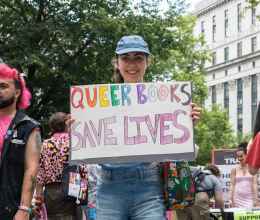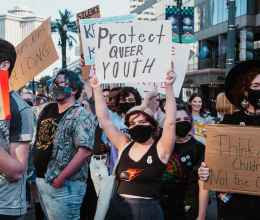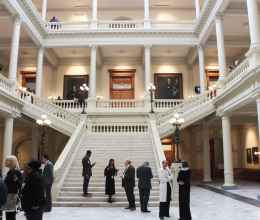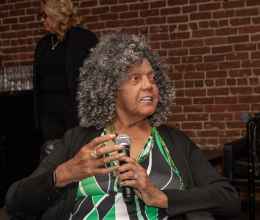
Calls for anti-discrimination law, religious protections follow ruling
By Jill Nolin | Moultrie Observer | June 4, 2018
ATLANTA – The nation’s high court may have sided with a Christian baker who refused to create a wedding cake for a same-sex couple, but civil rights advocates still found cause for celebration in what was widely viewed as a limited decision on the issue.
“The ruling emphatically does not give businesses a blank check to discriminate against gay people under some twisted theory of the First Amendment,” said Sean J. Young, legal director with the ACLU of Georgia.
Rather, Young pointed to several passages – endorsed by eight of the justices – that said gay and lesbian people shouldn’t be subjected to such indignities when navigating the marketplace.
The ruling prompted advocates to renew the call for a state anti-discrimination law in Georgia. Colorado law prohibits discrimination on the basis of sexual orientation.
“I hope that our legislators will look carefully at the lessons to be learned from this Supreme Court decision and will move forward in the next session to protect people of faith but also to protect members of the LGBT community,” Jeff Graham, executive director of Georgia Equality, said at a press conference held Monday at the National Center for Civil and Human Rights.
“This decision, I believe, supports the contention that all people are worthy of protection against overt discrimination,” Graham said. “And we have a unique opportunity in Georgia to lead the country on finding that middle ground where all people can be protected.”
Graham said he hoped the ruling would begin to chip away at what he called a “false dichotomy” that pits people of faith against gays and lesbians when he said many people identify as both.
Georgia lawmakers have been wrestling with religious liberty measures for several years. They passed a bill in 2016 that would have allowed some faith-based groups to deny services to someone if doing so violated their beliefs, but Republican Gov. Nathan Deal struck down the bill under tremendous pressure from the business community.
If Monday’s decision emboldens religious freedom supporters in Georgia, it will be a different governor who determines the fate of such a proposal.
Deal is finishing his last year in office, and the two candidates competing for the Republican nomination for governor – Lt. Gov. Casey Cagle and Secretary of State Brian Kemp – have both pledged to support religious liberty measures.
“The Supreme Court confirmed what we already knew: The Constitution protects religious exercise and expression,” Cagle said Monday. “There’s no clause that says ‘unless the left deems it offensive.’”
From Kemp: “As governor, I’ll stand up to the radical left and politically correct. We will never apologize for protecting religious liberty and living out our faith.”
The Democratic gubernatorial candidate, former House Minority Leader Stacey Abrams, has said she would veto measures that she says enshrine discrimination in state law.
“Under my leadership, every Georgian will know they can live and work in a state that will treat them with dignity, respect, and allow them to prosper, no matter who they are,” Abrams said Monday.
Ultimately, the U.S. Supreme Court left for another day tough questions on how the country should balance someone’s religious rights with protections from discrimination for others.
The justices did, however, find with a 7-to-2 vote that the Colorado Civil Rights Commission violated Denver-area baker Jack Phillips’ First Amendment rights when it demonstrated what it called an anti-religious bias.
That commission heard a complaint against Phillips after a same-sex couple, Charlie Craig and Dave Mullins, reported that the baker refused to make a customized cake for their wedding reception in 2012.
Mike Griffin, who is a Baptist pastor and lobbyist for the Georgia Baptist Mission Board, said the ruling lends credence to claims that Christians are being unfairly targeted for their traditional views on marriage.
“There seems to be a horrendous bias against Christians who are just trying to practice their faith as orthodox Christianity has for 2,000 years,” Griffin said.
The commission’s treatment of the Christian baker, Griffin said, shows why legal protections are needed for the faith community, including in Georgia.
But it remains to be seen whether Monday’s decision will really influence Georgia’s religious liberty debate in a meaningful way. Virginia Galloway with the Faith and Freedom Coalition called the decision a step in the right direction.
“What it really does is just open the door for further cases,” Galloway said. “And then those cases will – one by one – determine the direction we’re going in this country.”
The Associated Press contributed to this report.
Photo Caption: Jeff Graham, executive director of Georgia Equality, talks at a press conference held Monday at the National Center for Civil and Human Rights. Jill Nolin/CNHI News Service
Photo Caption: Jeff Graham, executive director of Georgia Equality, talks at a press conference held Monday at the National Center for Civil and Human Rights. Jill Nolin/CNHI News Service
Related Issues
Related content

SB 180 - "Religious Freedom" Restoration Act
March 13, 2024
Legislative Recap: Five Bills To Watch Through the End of Session
March 8, 2024SB 378
February 22, 2024HB 936
February 22, 2024
Legislative recap: Committee Passes Anti-LGBTQ+ Bill Without Taking...
February 16, 2024